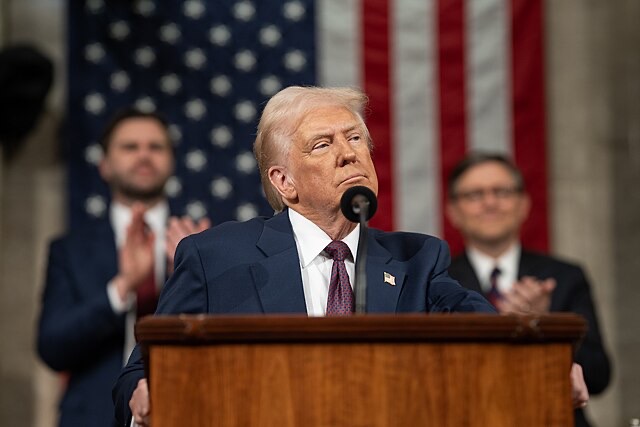US President Donald Trump has announced a new arrangement for sending American-made Patriot air defence systems to Ukraine through NATO, with the alliance footing the bill for the crucial weapons as Kyiv faces intensified Russian aerial attacks.
In an exclusive interview with NBC News on Thursday, Trump revealed that the United States would supply weapons to NATO, which would then distribute them to Ukraine. “We’re going to be sending Patriots to NATO, and then NATO will distribute that,” Trump said, adding that “NATO is going to reimburse the full cost” for the weapons sent on to Ukraine.
The announcement comes as Ukraine’s President Volodymyr Zelensky confirmed in Rome on Thursday that he had requested 10 Patriot systems from the United States, with Germany ready to pay for two systems and Norway prepared to finance one. We have a positive dialogue with President Trump regarding the Patriot system,” Zelensky said at a press conference following a meeting of the so-called “Coalition of the Willing.
Trump’s decision marks a shift from earlier this week when the Pentagon had halted some shipments of critical weapons, including Patriot interceptor missiles and precision artillery shells. The pause had raised concerns in Kyiv that its air defences could run low in a matter of months. When asked about the weapons pause on Thursday, Trump told NBC News: “I don’t know anything about it.
The urgency of Ukraine’s need for enhanced air defences was underscored by Russia’s latest assault. On Tuesday night, Ukraine was hit by a record 728 drones in what Zelensky called “one of the most large-scale air attacks” of the war. The massive aerial assault also included 13 missiles, with the northwestern city of Lutsk bearing the brunt of the attack.
Ukraine’s Air Force reported that 711 of the drones were shot down or otherwise neutralised, with seven missiles also intercepted. However, six Kinzhal aeroballistic missiles managed to bypass Ukraine’s air defences amid the shortage of Patriot systems. One civilian in the Khmelnytskyi region suffered fatal injuries from drone debris.
US Secretary of State Marco Rubio told reporters on Friday that he had urged countries including Germany and Spain to hand over some of their existing Patriot batteries. “We have continued to encourage our NATO allies to provide those weapons… since they have them in their stocks, then we can enter into financial agreements… where they can purchase the replacements,” Rubio said.
The financial arrangement outlined by Trump appears to address concerns about depleting US stockpiles whilst ensuring Ukraine receives vital defensive weapons. NATO Secretary General Mark Rutte confirmed he had spoken with Trump earlier on Thursday, posting on social media: “I’ve just spoken with President Trump & am now working closely with Allies to get Ukraine the help they need.
Zelensky revealed that European partners are stepping up to help finance the systems. “Germany is ready to pay – I have an agreement with them – two systems. Norway is ready to pay – I have bilateral agreements with the prime Minister – for one system,” he said, adding that he awaits responses from the US and system manufacturers regarding delivery dates.
The Patriot air defence batteries, and the interceptor missiles they fire, play a critical role in defending Ukrainian cities from Russian cruise and ballistic missile attacks. With its advanced radar and tracking capabilities and high interception rate, the Patriot is regarded as one of the world’s best air defence systems. However, it is also eye-wateringly expensive, with a single battery, including missiles, worth around $1bn (£740m).
Trump’s announcement follows his expression of frustration with Russia’s Vladimir Putin. During the NBC interview, Trump said he was “disappointed in Russia” and revealed plans to make a “major statement” on Russia on Monday, though he declined to elaborate on its nature.
The president’s comments came after he complained earlier this week that Putin’s “very nice” attitude during a recent phone call turned out to be meaningless. They’re getting hit very hard now,” Trump said of Ukraine, acknowledging the need for continued defensive support.
Ukraine’s vulnerability was highlighted in June, which saw the highest monthly civilian casualties in three years, with 232 people killed and more than 1,300 injured, according to the UN. Russian aerial attacks have increased in frequency and size, with the latest barrage prompting Poland, a NATO member, to scramble fighter jets and place its armed forces on highest alert.
The arrangement represents a complex balancing act for the Trump administration, which has expressed reluctance to become more deeply involved in the conflict whilst recognising Ukraine’s urgent defensive needs. Sources familiar with discussions told Axios that Trump had told confidants “this isn’t my war,” but acknowledged it would become so if he continued sending arms to Ukraine.
Ukrainian officials have warned that without additional air defence systems, Russia could increase its drone attacks to 1,000 per night. The country’s existing Soviet-era S-300 surface-to-air missiles and Western-made NASAMS work alongside Patriots to maintain what the military calls a “layered defence,” but the advanced American systems are crucial for intercepting ballistic missiles.
As Zelensky’s envoy Keith Kellogg prepares to meet Ukrainian officials in Rome, the focus remains on securing a steady supply of defensive weapons. “We’re counting on our partners to help us close the skies and provide the tools necessary for victory,” Zelensky said, whilst Trump emphasised that the weapons being sent would be “defensive weapons, primarily.”
The NATO funding mechanism announced by Trump could provide a sustainable model for continued support whilst addressing American concerns about depleting domestic stockpiles and financial burden. However, with production constraints and multiple global conflicts creating competition for limited supplies, the timeline for delivering the requested systems remains uncertain.
Follow for more updates on Britannia Daily



